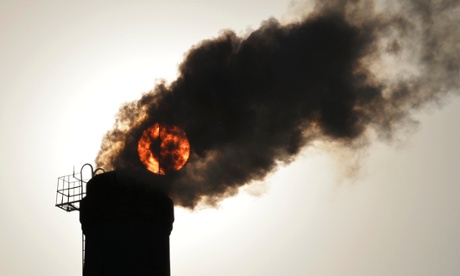Adam Vaughan and Tania Branigan at The Guardian report the claim, later withdrawn, by a high-level advisor representing China’s Advisory Committee on Climate Change that by the end of the decade, China’s government would limit its total carbon emissions for the first time:
He Jiankun, chairman of China’s Advisory Committee on Climate Change, told a conference in Beijing on Tuesday that an absolute cap on carbon emissions will be introduced.
“The government will use two ways to control CO2 emissions in the next five-year plan, by intensity and an absolute cap,” Reuters reported He as saying. Though not a government official, He is a high level advisor.
However, Jiankun later in the day appear to row back on the comments. “What I said today was my personal view. The opinions expressed at the workshop were only meant for academic studies. What I said does not represent the Chinese government or any organisation,” he told Reuters.
While environmentalists broadly welcomed his initial remarks, they cautioned that it was far from clear at what level the cap would be set and said it needed to be enforceable. [Source]
Andrew Revkin at The New York Times further clarified the confusion surrounding He Jiankun’s remarks:
I consulted with The Times’s Beijng bureau. Christopher Buckley, a reporter [based in Hong Kong] who in 2011 had covered China’s emissions plans [and similar pushes from advisers to adopt a cap] while with Reuters, spoke with He Jiankun, who told him repeatedly that he did not in any way speak for the government, or the full expert climate committee.
Here’s Buckley’s translation:
It’s not the case that the Chinese government has made any decision. This is a suggestion from experts, because now they are exploring how emissions can be controlled in the 13th Five Year Plan…. This is a view of experts; that’s not saying it’s the government’s. I’m not a government official and I don’t represent the government.
[…] Other, more recent news coverage has reflected that this isn’t China’s position, although many experts in Beijing (including at the meeting I’m participating in) foresee an eventual cap and a peak in China’s emissions sometime after 2030. [Source]
At Foreign Policy, Keith Johnson notes that He’s vision of a hard cap on carbon emissions would pose significant difficulties for China:
What was especially intriguing about his comments at the conference in Beijing, aside from the timing, is that an absolute cap on pollution would be something of a departure for China.
Beijing’s formal environmental goals are designed to make the economy relatively cleaner but allow overall greenhouse gas emissions to keep rising as the economy keeps growing. The latest official targets, for instance, are meant to cut carbon emissions per unit of GDP by 2015, rather than cutting carbon emissions outright. China is struggling to meet even those lower targets. Meeting these potentially more ambitious ones will be even harder. [Source]
At The Smithsonian, Colin Schultz compared China’s per capita emissions favorably to those of the U.S.:
Though China is the top carbon polluter in the world, its per capita emissions aren’t actually all that high. At 6.2 metric tons per capita, China is much cleaner than the U.S. on a per person basis. In the U.S., emissions are around 17.6 metric tons per person—2.8 times higher.
How much of an effect China’s proposed plan will have is not clear, as the details have yet to be laid out.
The U.S. Environmental Protection Agency’s own plan, released yesterday, would reduce carbon emissions from existing power plants by 30 percent of 2005 emissions levels within the next 16 years. China and America together represent 45 percent of global carbon emissions—with the two powers on board working to freeze or reduce their emissions, we may just yet have a shot of stalling global climate change. [Source]
Read more about carbon emissions in China at CDT.








